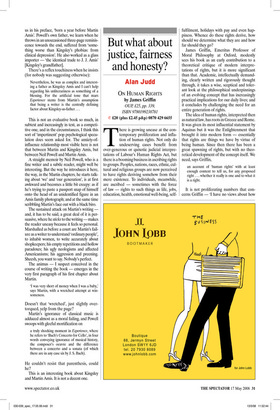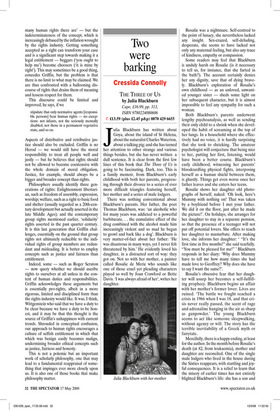But what about justice, fairness and honesty?
Alan Judd
ON HUMAN RIGHTS by James Griffin OUP, £25, pp. 339, ISBN 9780199238781 ✆ £20 (plus £2.45 p&p) 0870 429 6655 There is growing unease at the contemporary proliferation and inflation of human rights. Not only do undeserving cases benefit from over-generous or quixotic judicial interpretations of Labour’s Human Rights Act, but there is a booming business in ascribing rights to groups. Peoples, nations, races, ethnic, cultural and religious groups are now perceived to have rights deriving somehow from their mere existence. To individuals, meanwhile, are ascribed — sometimes with the force of law — rights to such things as life, jobs, education, health, emotional well-being, self fulfilment, holidays with pay and even happiness. Whence do these rights derive, how should we determine what they are and how far should they go?
James Griffin, Emeritus Professor of Moral Philosophy at Oxford, modestly sees his book as an early contribution to a theoretical critique of modern interpretations of rights, but it is more significant than that. Academic, intellectually demanding, clearly written and rigorously thought through, it takes a wise, sceptical and tolerant look at the philosophical underpinnings of an evolving concept that has increasingly practical implications for our daily lives; and it concludes by challenging the need for an entire generation of rights.
The idea of human rights, interpreted then as natural law, has roots in Greece and Rome. It was given its most influential statement by Aquinas but it was the Enlightenment that brought it into modern form — essentially that rights are things we have by virtue of being human. Since then there has been a great spawning of rights, but with no theoretical development of the concept itself. We need, says Griffin,
an account of ‘human rights’ with at least enough content to tell us, for any proposed right . . . whether it really is one and to what it is a right.
It is not proliferating numbers that concerns Griffin — ‘I have no views about how many human rights there are’ — but the indeterminateness of the concept, which is increasingly debased by the inflation wrought by the rights industry. Getting something accepted as a right can transform your case and is a significant step towards making it a legal entitlement — beggars (‘you ought to help me’) become choosers (‘it is mine by right’). This may sometimes be a good thing, concedes Griffin, but the problem is that there is no limit to what may be claimed. We are thus confronted with a ballooning discourse of rights that drains them of meaning and lessens respect for them.
This discourse could be limited and improved, he says, if we
stipulate that only normative agents [responsible persons] bear human rights — no exceptions: not infants, not the seriously mentally disabled, not those in a permanent vegetative state, and so on.
Aspects of distributive and retributive justice should also be excluded. Griffin is no Herod — we would still have the moral responsibility to treat all people well and justly — but he believes that rights should not be allowed to become coextensive with the whole domain of moral obligation. Justice, for example, should always be a bigger and broader concept than rights.
Philosophers usually identify three generations of rights: Enlightenment libertarian, such as freedom of assembly, expression, worship; welfare, such as a right to basic food and shelter (usually regarded as a 20th-century development but actually asserted in the late Middle Ages); and the contemporary group rights mentioned earlier, ‘solidarity’ rights asserted in the past quarter century. It is this last generation that Griffin challenges, essentially on the ground that group rights not ultimately reducible to the individual rights of group members are redundant and misleading. It is better to employ concepts such as justice and fairness than entitlement.
Indeed, some — such as Roger Scruton — now query whether we should ascribe rights to ourselves at all unless in the context of human duties and responsibilities. Griffin acknowledges these arguments but is essentially pro-rights, albeit in a more rigorous, limited and disciplined form than the rights industry would like. It was, I think, Wittgenstein who said that we have a duty to be clear because we have a duty to be honest, and it may be that this thought is the source of Griffin’s unhappiness with current trends. Shrouded in conceptual confusion, our approach to human rights encourages a culture of selfish entitlement in which that which was benign easily becomes malign, undermining broader ethical concepts such as justice, fairness and honesty.
This is not a polemic but an important work of scholarly philosophy, one that may lead to a fundamental reappraisal of something that impinges ever more closely upon us. It is also one of those books that make philosophy matter.











































































 Previous page
Previous page